Diversity and Equity
Community-Informed STEM Teaching Strategies for Early Childhood Educators During COVID
Connected Science Learning July–August 2022 (Volume 4, Issue 4)
By Tarana Khan, Cindy Beckett, Susana Beltran-Grimm, and Suzie Hicks
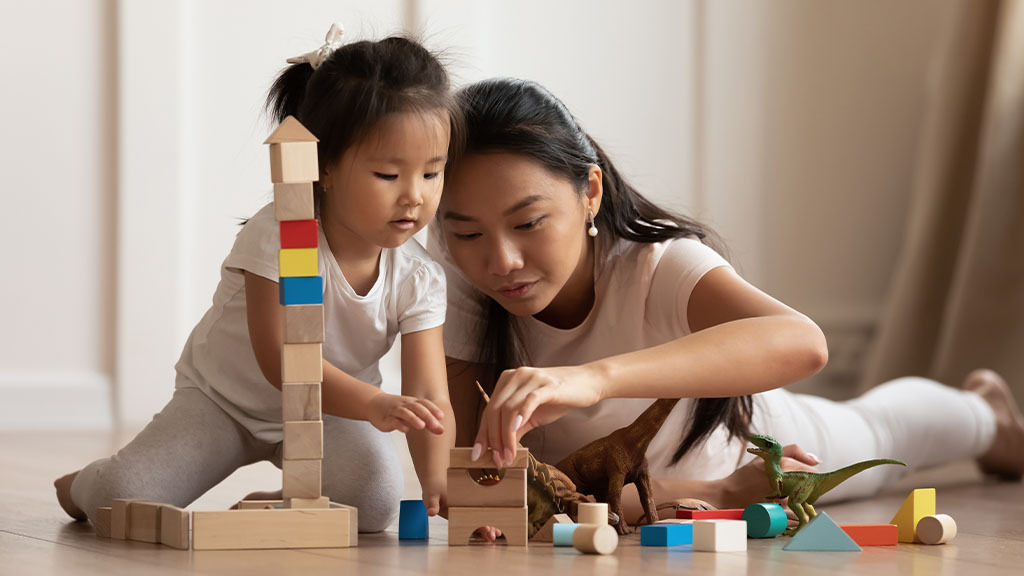
Early childhood educators faced a myriad of COVID-19 challenges when shifting to a virtual landscape (Timmons et al. 2021). Most notably, lack of access to free, high-quality standards-aligned resources and professional development opportunities around teaching STEM. As educators began navigating how best to support the unique needs associated with serving students in home settings, there was a clear need to provide comprehensive professional development opportunities to support children’s learning at home. PBS SoCal responded by first evaluating the primary concerns, stressors, and desires in regards to STEM teaching that educators faced due to the pandemic. We used community feedback to design and offer virtual professional development opportunities that provided strategies to support educators in developing STEM skills during the pandemic.
Many early learning math and STEM teachers do not believe they have the knowledge, beliefs, or confidence to deliver high-quality early learning STEM instruction (Sheridan et al. 2020). Furthermore, high-quality professional development may be difficult for teachers to access due to logistical constraints. Online high-quality professional development for early learning educators is one way to provide access to resources and knowledge in math and STEM to enhance confidence and pedagogy for instruction (Sheridan et al. 2020). PBS SoCal’s Early Learning Educator Professional Development pilot webinar series integrated evidence-based teaching practices with PBS KIDS content, focusing on playful learning experiences for early learning educators to help create or recreate educational opportunities at home. These webinars highlighted both content and techniques for helping early learning educators identify parts of their students’ lives, routines, traditions, and cultures that can be STEM learning opportunities. Learning objectives included helping early learning educators (1) identify and understand math and science Common Core Standards that are primary foci in kindergarten, (2) implement basic activities to help increase and strengthen foundational early learning skills in young children to support kindergarten readiness, and (3) recognize and understand the role they play in supporting families to create educational learning opportunities at home. In this article we share the development, design principles, implementation, and evaluation of PBS SoCal Early Learning Educator Professional Development webinars, which focused on helping educators support STEM teaching and learning by scaffolding high-quality learning experiences that students could engage in at home. We conclude with a description of how our findings may be applied to in-person learning environments.
PBS SoCal Early Learning Educator Professional Development Webinars
COVID-19 brought to light the lack of existing virtual professional development opportunities for early childhood educators. To address this challenge—which especially impacted preK, transitional kindergarten, and kindergarten classroom teachers and informal educators such as childcare providers, librarians, and family engagement specialists—PBS SoCal began developing virtual early learning professional development training shortly after the pandemic began.
The PBS SoCal Early Learning Educator Professional Development webinars were designed for early childhood educators to engage in STEM learning opportunities that would help them prepare for new challenges associated with teaching remotely. This pilot webinar series was designed to engage early childhood educators in the importance of encouraging early exposure to STEM to increase kindergarten readiness in early science and math skills. The purpose of this robust offering of educator professional development trainings was to support STEM learning at home through programs informed by feedback from both parents and educators on their needs for supporting children’s learning at home. The evidence-based strategies and activities promoted in the PBS SoCal webinars allow educators to help children unlock their curiosity, problem solve, and foster their STEM skills through hands-on, collaborative activities that encourage parents and children to play and learn together. Continuous internal evaluations of the PBS SoCal educator webinars demonstrate that early childhood educators who participate in professional development activities typically emerge prepared to guide young children’s intellectual curiosity, serve as community leaders who build upon parental and caregiver strengths, and serve as culturally responsive advocates for at-home learning (Khan 2021).
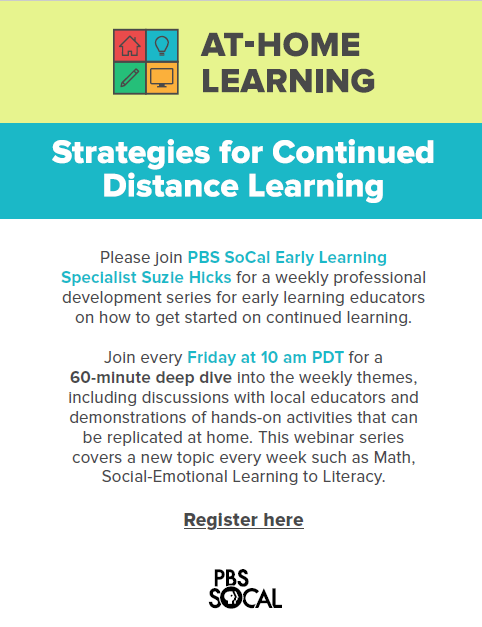
PBS SoCal Educator and Family Community Needs Assessment
To effectively understand how our educator engagement programs could pivot to meet the unique learning needs of early learners brought on by the pandemic, we sought feedback from our community. A community needs assessment with families and early childhood educators explored responses from 194 Californian parents and 110 educators (Khan 2020). Parent respondents were primarily Latino (65%) mothers (92%), and 86% had children under age 8. Educators were majority Latino (64%) and Black (17%) teachers who taught preschool (80%). Thirty-two percent of PBS SoCal’s educator audience teaches classrooms in both English and Spanish to meet the needs of diverse learners. Sixty percent of the educators that PBS SoCal reaches through professional development webinars are Latino, and at least 40% of educators who participate in PBS SoCal professional development webinars serve Latino families.
Parents were primarily concerned with keeping their kids physically and emotionally healthy and active, maintaining the time commitment required to support distance learning, and making sure their children were learning what they needed to know through distance learning. Similarly, educators were mostly concerned about supporting the social and emotional health of their students, making sure their students were learning the required material, and ensuring that families were able to provide the time and participation necessary to make distance learning the most effective for students. Parents (n = 79) and educators (n = 62) also provided qualitative feedback on specific emotional, physical, and mental health concerns, including that children were experiencing feelings of isolation and anxiety due to lack of social interaction and physical activity.
Parent findings
The following themes emerged from parent responses.
- Overwhelmed by having to teach extra material due to time constraints of distance learning
- Worries about their child falling behind in required academic material
- Needing extra guidance on how to support their child at home in ways that could work within their existing schedules and capabilities, as many parents struggled with figuring out online learning portals
Educator findings
The following themes emerged from educator responses.
- Worries that their students would not be able to succeed in a new virtual learning environment
- Concerns about whether children would be able to receive the support they needed if children and parents did not understand the material being taught at home
- Ensuring that students’ individualized needs will continue to be supported in remote learning, while being aware that some busy parents would be unable to be involved or provide the necessary time and materials to make sure their children were learning and engaged in school
- Not having adequate training on new curriculum and how to transition to a distance learning format
For both parents and educators, additional ways to support the mental health and well-being of their families and students were among the top priorities. Educators expressed wanting additional training and guidelines on how to engage families at home, how to create hands-on educational activities that families can easily do at home, and strategies on how to create engaging distance learning experiences. In addition to more educational resources and support for distance learning, parents also highlighted a need for educational activities that they could do at home, especially STEM activities, arts and crafts, and educational recipes.
Educators expressed interest in the following:
- STEM-focused activities that would be easy for children to do at home (even without access to computers or the internet)
- Resources for parents to help manage distance learning and strategies that educators could use to improve their virtual lessons
- Virtual professional development webinars that focused on extra support for distance learning; best practices for online classroom management; guidelines on how to help families navigate virtual learning spaces; and timely approaches to social-emotional well-being for children, parents, and educators
The results from the community needs assessment illustrated how the concerns and urgent needs from families and early childhood educators were complementary, highlighting the need to provide educators with a professional development series that was specifically designed to provide guidance on how they could meet families’ needs during the pandemic.
Development of PBS SoCal Early Childhood Educators Professional Development Webinar Series for Distance Learning
PBS SoCal previously developed and implemented educator engagement in Southern California communities focused on STEM. This professional development program served as a model for the pilot webinar series. Using this previous implementation as a model for piloting new educator trainings, PBS SoCal developed The Early Learning Professional online trainings to provide a high-quality, interactive professional development webinar series that integrates evidence-based teaching practices with PBS and PBS KIDS content, with a focus on playful learning experiences and media integration for early learning educators to help families and children (ages 2–6). Our pilot webinar series lasted for three weeks, with a new topic covered each week, with each webinar providing early learning educators with opportunities to participate in 60-minute deep dives into a weekly theme. The first week covered science, followed by math in the second week, and social-emotional learning in the third week. The webinars were hosted by a PBS SoCal Early Learning Coordinator, who highlighted different early learning concepts over the course of the series, featuring tips, STEM activities, and resources to train early learning educators on practicing the skills and implementing the learnings with young children and families. Each webinar featured demonstrations of hands-on activities that could be replicated at home. Educators were recruited to participate in the webinars through partner school districts.
The webinar series illustrated both content and techniques for engaging in learning outside the classroom, helping early learning educators identify parts of their students’ lives, routines, traditions, and cultures that could be learning opportunities. Because families requested ways to support their child at home that would work within their existing schedules, a major focus of the webinars was also to describe how families could, for example, practice math with their child while cooking or sorting while folding laundry, thus providing educators with ideas they could use to support families in turning everyday routines and chores into opportunities for exploration and conversations about math and science.
Theoretical foundation
PBS SoCal’s Early Learning Professional Development Webinar Series draws from principles related to learning theories including andragogy, experiential learning, and the importance of play in early learning to develop a thoughtful and cohesive webinar program for early learning educators (Alharbi and Alzahrani 2020; Girven et al. 2016; Machynska and Boiko 2020). Andragogy refers to methods for helping adults learn. Andragogy builds on adults’ previous experiences, employing real-life applications in which adult learners acquire knowledge, skills, and abilities (Machynska and Boiko 2020). The andragogy model consists of the following assumptions: Adults have the need to know why they are learning something and a need to be self-directed; adults bring work-related experiences into learning situations; adults enter into learning experiences with a problem-centered approach to learning; and adults are motivated to learn by both extrinsic and intrinsic motivators (Alharbi and Alzahrani 2020; Knowles 2015). Through this model, the professional development facilitator designs an environment that will encourage learning that prioritizes the learners' role in identifying their needs (Knowles 2015). In other words, andragogy through experiential learning serves to teach an adult learner how to learn and why learning is meaningful by creating an experience that was built in response to their needs.
Adult learners are usually expected to know and understand where new knowledge fits in with the old—thus, the webinars were designed to create experiences that were learner-centered and built on educators’ existing skills by helping them apply these skills in new ways, in this case for remote learning. The webinar series model featured early learning content, resources, skills, and playful learning strategies with media integration. The webinars also incorporated virtual active learning opportunities to explore specific topics such as math and science, supported participant collaboration, and provided opportunities for facilitated discussions. The Early Learning Coordinator modeled best practices through examples, offered feedback, and welcomed spaces for participant reflection. We also included pre- and post-assessments to help meet continuing training requirements for licensed providers.
Play in early learning is essential to the learning experience for young children (Girven et al. 2016). Thus, the Early Learning Educator Professional Development Webinars were designed to follow the widely applied model “Watch, Play, Explore, and Share” structure which was developed by PBS KIDS, as described in Table 1.
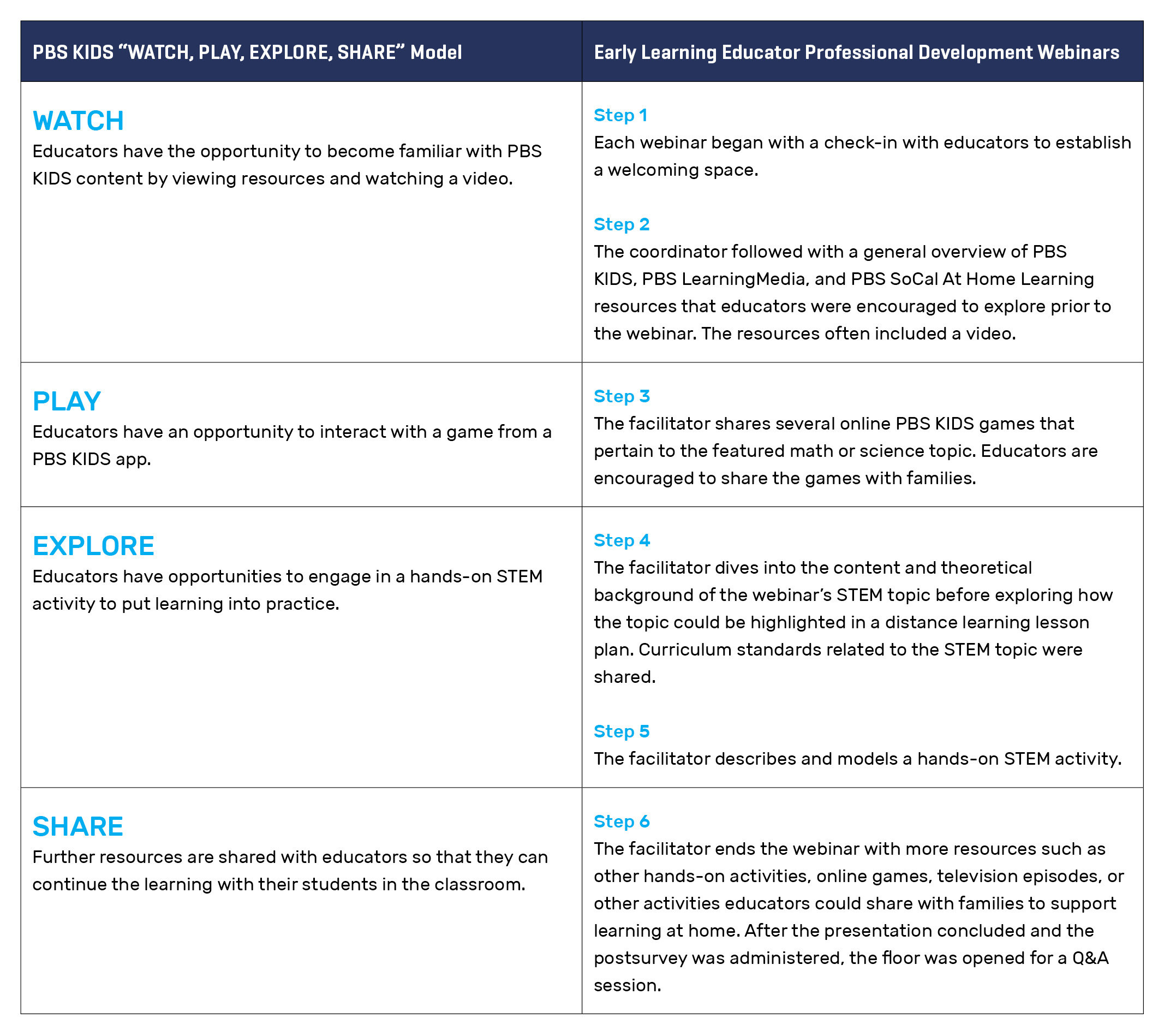
Click here for larger image
Design Principles for Developing the PBS SoCal Early Educator Professional Development Webinars
Webinar content was designed by the Early Learning Team at PBS SoCal, often with the help of a content expert. The Early Learning Team created and repurposed existing media (PBS and PBS KIDS content) and learning activities for the webinars. The Early Learning Team also relied on the principles of development for multimedia learning when designing the webinar content (Mayer 2008). Some core principles include supporting the concepts with visuals, chunking the content into digestible modules or lessons, and using narration to explain concepts rather than on-screen text. The PBS SoCal Early Learning Professional Development Webinars also used the following design principles to develop the curriculum and implementation of the webinars.
- Uplift and value the lived experiences of communities served. According to MacDonald et al. (2020), socioeconomically disadvantaged and indigenous students benefit when their teachers participate in STEM educator professional development that includes pedagogical and curricular methods to address inequities and create success for STEM early learners. Given the large proportion of Latino families in Southern California, high-quality professional development for early learning educators that provides training on how to support low-income or Latino families to handle the shift from in-person to virtual preschool became essential. Our webinar series facilitators received training from the Learning for all: Inclusive and Equitable Facilitation course, provided by PBS Kids Self-Paced Learning for PreK–2 Teachers, which focused on building inclusive, culturally responsive, and anti-racist practices into the facilitation of family, educator, and community engagement. Facilitators were encouraged to reflect on their own attitudes and implicit biases and recognize that educators and families bring with them their own values, beliefs, and lived experiences. In turn, during webinars, facilitators then encouraged educators to view families through the same lens—to recognize what parents are already doing at home and simply help them unlock more learning opportunities. Educators were also offered the opportunity to attend EdCamps and Educator Happy Hours after the webinars, which allowed educators to connect, share, and learn with one another and bring their lived experiences to the forefront.
- Keep equity at the center. The webinars also helped early childhood educators ensure equity with their distance learning strategies with all families they serve. This was crucial because families have differing access to technology and materials as well as ability to devote time to remote learning at home (Todd 2020). The closing of schools exacerbated technological barriers and inequities for some families, with many families struggling to use online school portals or join Zoom meetings. Webinar facilitators encouraged educators to reach out to families in their preferred communication method (e.g., texts instead of email). Equity was centered within each webinar by including justice-based pedagogy and a discussion about race, identity, varying family structures, and community. Accessible and free bilingual resources were shared during the workshops. The featured activities required simple materials to increase the feasibility of educators using the resources within their classrooms and with families. Many of these resources are local to Southern California to make them more relevant for Latino families. Because the webinars are free, they increase access of underserved communities to resources that can help support both educators and students.
- Modeling positive interactions and conversations for families. Remote early education can be especially challenging because younger children have shorter attention spans, parents have greater concerns about increases in screen time, and research indicates that successful early childhood education relies on high-quality face-to-face interactions between adults and children (Hamre and Pianta 2005; Rimm-Kaufman et al. 2009). Thus, the webinars were designed to help educators think of creative ways for them to support families in engaging in learning at home without screens. The webinar facilitator modeled positive interactions of exploration, experimentation, and conversations that educators themselves could use to support caregivers in teaching STEM topics at home using the same developmentally appropriate hands-on learning that usually occurs in classrooms (Todd 2020).
Webinar Implementation
Start with content and follow with the application
We started by describing the pedagogical principles of the topic at hand, providing external resources for educators to learn more about the topic at their own pace. We also described the best practices for application. We provided ample resources and examples to show how the pedagogy could be applied in real ways in educators’ classrooms and suggested cues on how to ensure the developmental appropriateness of activities for their students. For example, the facilitator provided strategies on how to modify activities for younger or older students or students with special needs based on their learning abilities. Each activity featured in the workshop was sourced from PBS LearningMedia or PBS for Parents, which allows the user to filter activities by age. PBS KIDS shows designed for specific age groups and subject matter were chosen for each webinar, keeping in mind the topic being explored and the population served. Feedback from educators indicated that they were not interested in seeing demonstrations of activities and were comfortable exploring links and videos on their own to find appropriate activities for their classrooms, so later webinars excluded demonstrations.
Showcase how STEM is accessible to families
One goal of the webinar series was to highlight the accessibility of STEM learning by showing educators how to encourage families to foster math and science learning using what they already had at home. To meet this need, the Early Learning Coordinator modeled hands-on activities and provided strategies on how educators could use common materials and objects to create fun, hands-on STEM activities that they could share with families. The Early Learning Coordinator demonstrated how simple materials such as cardboard boxes could become powerful tools for playful learning and family bonding by, for example, being transformed into pinatas that encouraged conversations about the unique characteristics of different shapes. Everyday household items such as pencils, sponges, and bananas were dunked in a tub of water after the Early Learning Coordinator encouraged educators to make predictions about which object would sink or float.
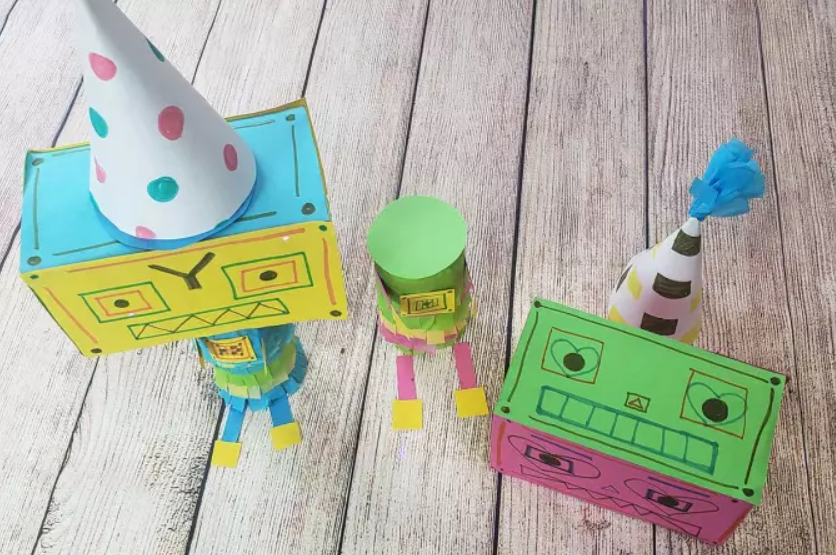
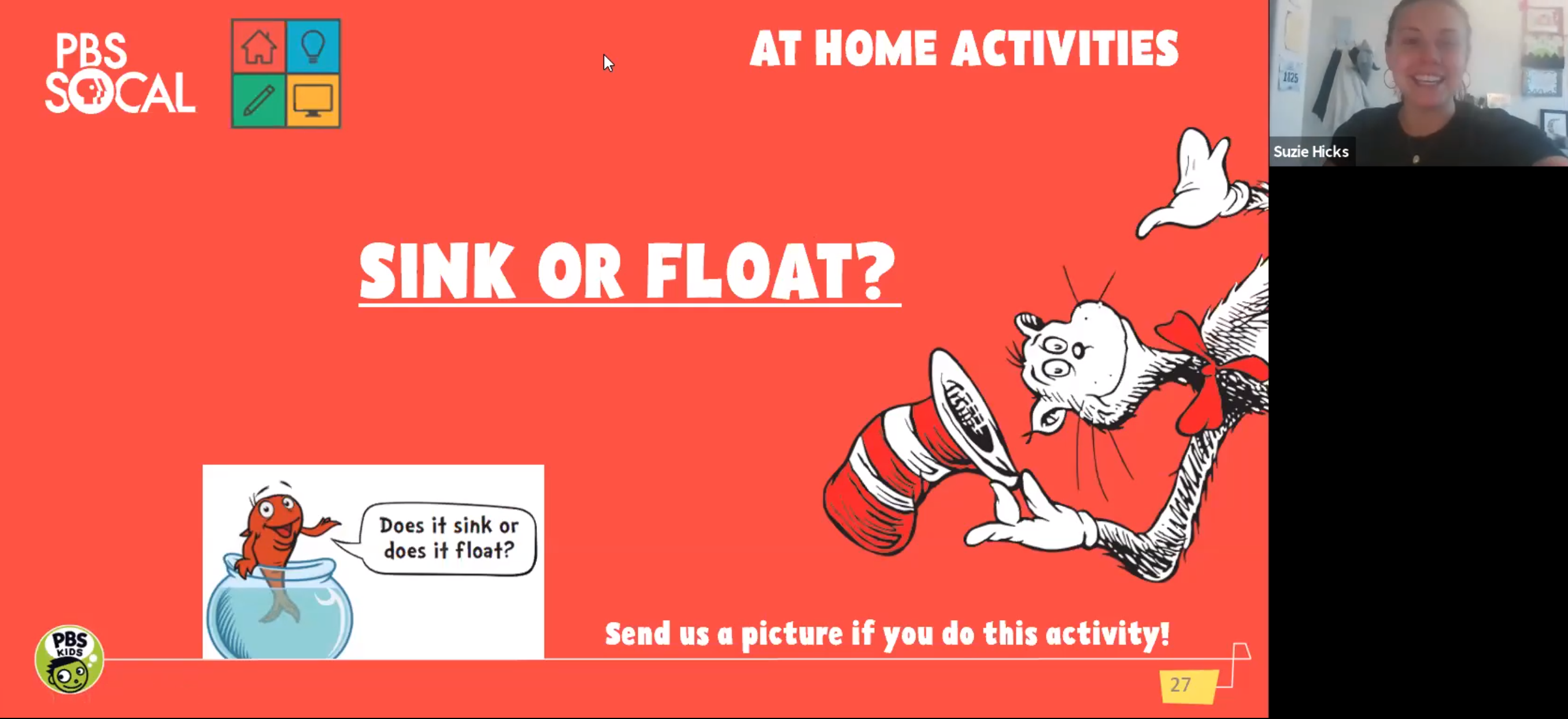
The webinars also focused on how a passion for science and engineering can be born from playing at home. Educators were encouraged to promote the idea that anyone could be a citizen scientist. For example, students can play NASA’s iPad game NeMo-Net, which helps NASA classify coral reefs by painting 3D and 2D images of coral. Data from the NeMo-Net game is fed into NASA’s global network for coral reef assessment and helps assess the health of coral reefs worldwide, allowing players to contribute to the collection of important marine science data from their homes.
Always leave room for questions and clarification
We provided space and time for educators to ask questions, encouraging them to use the Q&A feature of Zoom to ask questions while the webinar was in progress, with time for the Early Learning Coordinator to answer at the end.
Establish an educator following within the communities served
PBS SoCal established a database of educators who were interested in receiving information about upcoming webinars, monthly newsletters, and PBS SoCal resources, such as editorial content geared for early learning educators. We initially shared information about the webinars with school districts and community partners who shared them with their educators. Educators provided their email addresses when registering for webinars, joining the database. As educators shared the webinars with their colleagues, we continued to build the database. The primary purpose of the educator database was to continue communication with educators about upcoming events. Cultivating relationships with community partners and educators is key to establishing and maintaining a broad audience.
Evaluation and Feedback
Each webinar included an evaluation component, designed to determine how successful the training was at achieving the learning objectives and outcomes. Learning objectives included helping early learning educators (1) identify and understand math and science Common Core Standards that are primary foci in kindergarten, (2) implement basic activities to help increase and strengthen foundational early learning skills in young children to support kindergarten readiness, and (3) recognize and understand the role they play in supporting families to create educational learning opportunities at home.
We evaluated educators’ experiences with the webinars through pre-and posttests conducted via Zoom polls, with the pretest poll launched at the beginning of the webinar and the posttest poll at the end. Because educators had registered for the webinars with their email addresses, we were able to match responses across the pretest and posttest. We asked educators about their confidence using the resources presented in the webinar to teach their students specific topics and subjects covered during the webinar (e.g., science, math, and social-emotional learning). Out of the 686 educators who attended the At-Home Learning Strategies for Continued Distance Learning Webinar series, we received feedback from 542 educators, achieving a response rate of 79%.
Paired two-tailed t-tests were used to determine whether there was a statistically significant increase in educators’ confidence related to the featured webinar topic from presurvey to postsurvey. We measured the change in educator confidence in various math and science topics. Results indicated that there was a statistically significant increase in educator confidence in helping their students learn scientific inquiry and engineering design principles, math concepts, and social-emotional learning skills after participation in the webinar. An effect size above 0.14 indicates a large effect size. Table 2 details paired two-tailed t-test results.
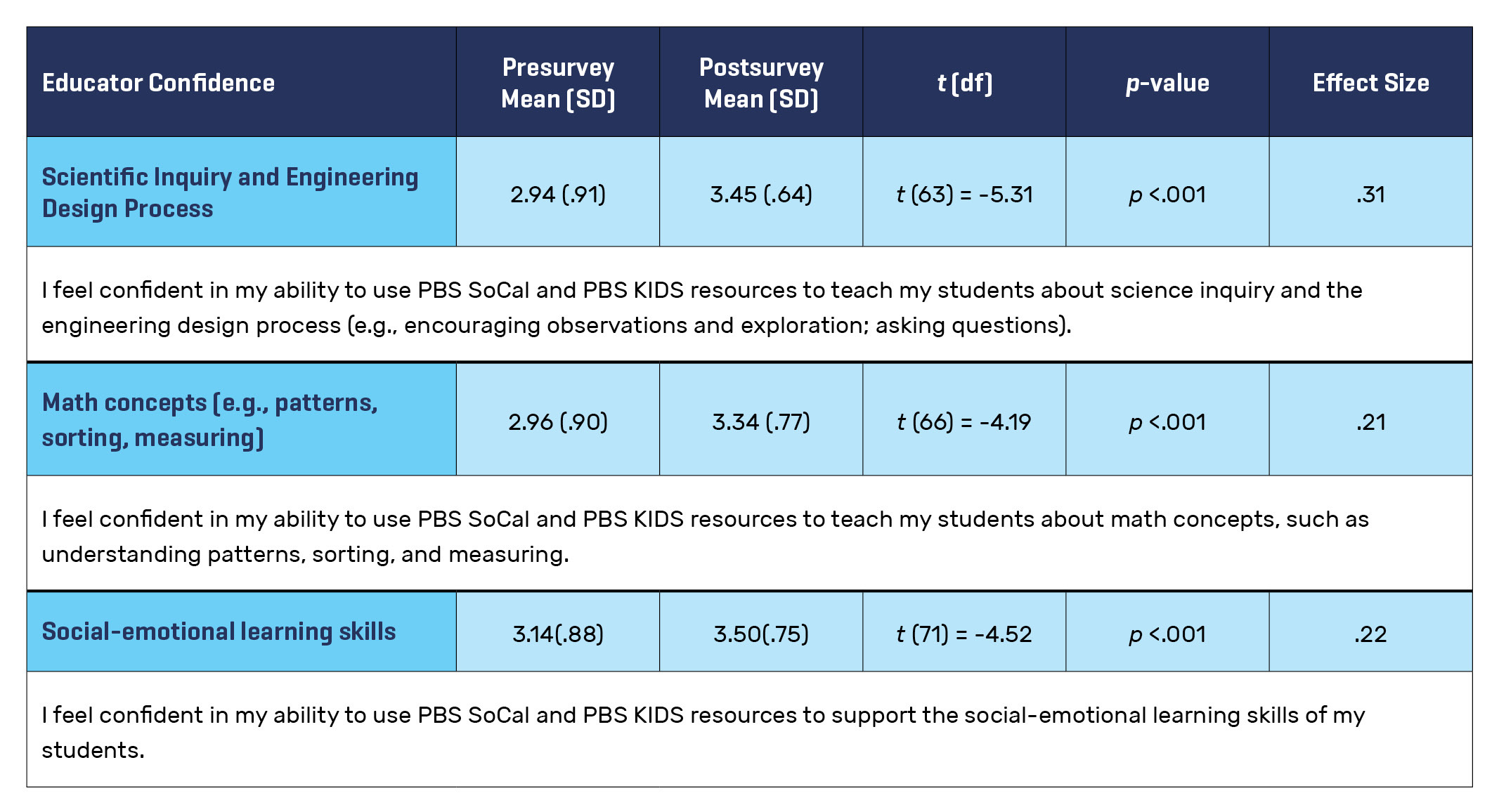
Click here for larger image
Across all three webinars, 97% of educators believed the information presented in the webinar would be useful for them, their students, and the families they work with.
Concluding Remarks
The pandemic created the need for high-quality virtual professional development opportunities for early childhood educators who were challenged to transition their classrooms to virtual spaces. As a response to a community needs assessment with parents and early childhood educators, and with consideration of expert recommendations for distance learning, PBS SoCal designed a pilot professional development series that provided educators with ample support on how to engage families in their young child’s STEM learning at home with hands-on, educational activities that families would easily be able to do at home with available materials. Through the webinar series, early childhood educators were equipped with guidelines and tools they could use to help support parent-child interactions through developmentally appropriate hands-on STEM learning experiences at home.
Findings from our program evaluation suggest that participation in the early educator webinar pilot was associated with statistically significant increases in confidence teaching students STEM, math, and social-emotional learning concepts using resources presented in the webinars.
Now that schools have returned to in-person learning environments, much of what we learned from designing early childhood educator webinars can still be applied to the current landscape of early childhood education. Parents continue to support their child’s learning at home outside of school hours and there is still a need for activities and guidance on how families can turn everyday routines and activities into learning activities. It is essential for educators to continue to check in with families to understand their current priorities and concerns when it comes to supporting their children’s learning at home. Thus, PBS SoCal continues to deliver curated and relevant resources to help make synchronous and asynchronous distance learning successful and engaging for educators and families. We are committed to providing early childhood educators with free, easily accessible, ongoing professional development opportunities to strengthen their skills. Future directions include seeking families who have been a part of classrooms with teachers who participated in the webinar to understand how the professional development has impacted families’ ability to support STEM learning at home.
Dr. Tarana Khan, PhD, is the Education Research and Evaluation Analyst at PBS SoCal in Costa Mesa, California; Cindy Beckett is a Doctoral Candidate at the American College of Education and an Evaluation Research Assistant at PBS SoCal in Costa Mesa, California; Dr. Susana Beltran-Grimm, EdD, is a Postdoctoral Researcher at Purdue University in West Lafayette, Indiana; and Suzie Hicks is a Master’s student at Columbia University in New York City and an Education Facilitator at PBS SoCal in Costa Mesa, California.
citation: Khan, T. C. Beckett, S. Beltran-Grimm, and S. Hicks. 2022. Community-informed STEM teaching strategies for early childhood educators during COVID. Connected Science Learning 4 (4).
Curriculum Professional Learning STEM Teaching Strategies Early Childhood Informal Education


